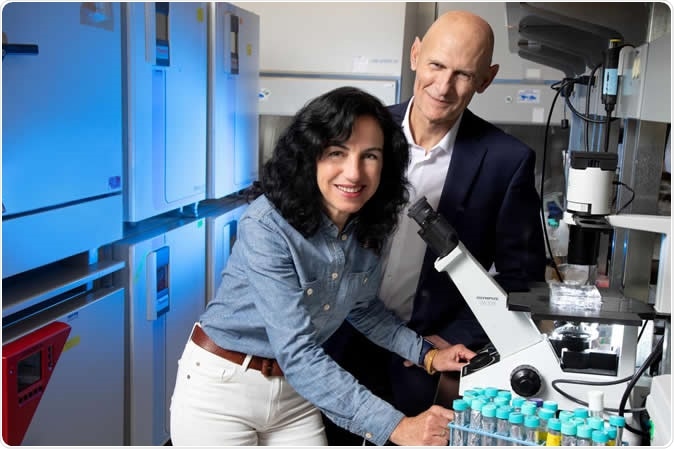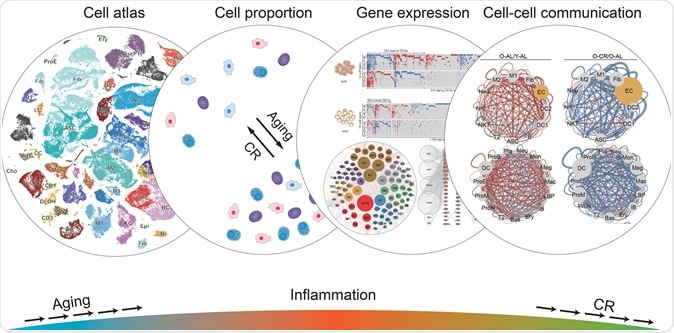Age is the Number 1 risk factor when it comes to dementia, diabetes, cancer, and metabolic syndrome, among other conditions. Aging introduces multiple changes at the cellular level, as many discoveries have shown over the last few years.
Animal experiments have shown that a significant component of this risk can be reduced by caloric restriction. However, the mechanism of this effect is not yet clear.
Caloric restriction
Science has shown for years that restricting the number of calories ingested while maintaining overall nutrition is a health-promoting lifestyle habit. It is associated with lower blood pressure and blood lipid levels, for one thing. It also brings down the incidence of heart disease, stroke, and diabetes, which are all more common with age. One possible reason is the loss of a significant amount of weight by many individuals – even though this is not the reason for the caloric restriction.
However, the reasons for these beneficial changes have not been clearly understood at the cellular level. One hypothesis is that calorie restriction slows metabolism. Another is that it reduces oxidative damage, which in turn minimizes tissue damage and the incidence of chronic disease. However, neither of these has been proven so far.
The study
The new study changes all that. Says researcher Juan Carlos Izpisua Belmonte, "Now we have shown all the changes that occur at a single-cell level to cause that. This gives us targets that we may eventually be able to act on with drugs to treat aging in humans."

From left: Concepcion Rodriguez Esteban and Juan Carlos Izpisua Belmonte. Image Credit: Salk Institute
Especially significant are the changes that occur in the aging process with caloric restriction. The new paper records the effects of caloric restriction on individual cells in rats.
The researchers studied 56 rats who were put on a diet with 30% fewer calories, compared to standard rat diets, from the age of 18 months to 27 months. In human terms, this corresponds to the period between 50 years and 70 years.
The investigators extracted almost 170 000 cells of 40 different types, from the rats, in two stages – at the beginning of the study and its end. These cells came from fat tissues, liver, kidney, aorta, skin, bone marrow, brain, and muscle.
In each of the cells that were taken from the animals, the genes were sequenced so that the impact of the dietary restriction on their expression levels could be identified. The scientists also examined the overall composition of the cell types found in any type of tissue before and after the experiment. Finally, they made a comparison of the changes in old and young mice on the standard vs. calorie-restricted diet.
Salk scientists show how caloric restriction prevents negative effects of aging in cells
The results
The investigators found that there were many changes occurring with age in the rats on a standard diet that failed to make their appearance in the cells taken from rats on the calorie-restricted diet. In fact, the tissues and cells in the old rats fed a calorie-restricted diet were very similar to those from the younger rats. There was an overall reduction of 57% in the age-related changes in the cell composition in rats on a calorie-restricted diet.

The illustration represents the ways in which caloric restriction affects various aspects of cellular function, with the overall result of reducing inflammation and the activity of many aging-related genes. Credit: Salk Institute
The cells and tissues that were turned down low included those that regulate immune function, inflammation, and fat metabolism. In almost all the tissues, there was a markedly increased number of immune cells with age – which was absent in the calorie-restricted rats. Especially in the metabolically active type of fat called brown fat, calorie restriction suppressed gene expression related to inflammatory activity at many loci, to the level more typical of young rats. This means that age-related inflammation can be regulated by this lifestyle modification.
The researchers examined the tissues to find out the transcription factors most obviously influenced by caloric restriction. Transcription factors are like the first level of a hierarchy that affects the activity and transcription level of multiple other genes. During this experiment, the researchers found that one factor called Ybx1 was found in altered concentrations with caloric restriction, not just in one cell but in 23 types of cells. This shows them that they are onto something big. They are now planning to investigate this phenomenon in more detail.
Implications
Comments another scientist, Concepcion Rodriguez Esteban, "People say that 'you are what you eat,' and we're finding that to be true in lots of ways. The state of your cells as you age clearly depends on your interactions with your environment, which includes what and how much you eat."
Another researcher Guang-Hui Liu says, "This approach not only told us the effect of calorie restriction on these cell types but also provided the most complete and detailed study of what happens at a single-cell level during aging." They hope to design new research based on this information, and possibly to find out new drug targets that could prevent aging and increase the lifespan as well as improve health.
Journal reference:
Caloric Restriction Reprograms the Single-Cell Transcriptional Landscape of Rattus Norvegicus Aging Ma, Shuai et al. Cell, https://www.cell.com/cell/fulltext/S0092-8674(20)30152-5